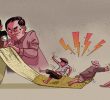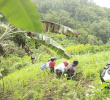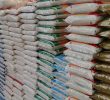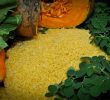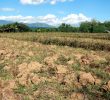
HIGH DEMAND. Isidro V. Albano, Mindanao Alliance of Dairy Industry Stakeholders Association (Madis) said during the press conference on Wednesday that only five percent of the whole demand for milk industry is addressed by local producers. (Ace R. Morandante/davaotoday.com)
DAVAO CITY – A group asked farmers to invest in the production of milk and other dairy products to fill the supply gap in the market.
Isidro Albano, president of the Mindanao Alliance of Dairy Industry Stakeholders (Madis) said the “only one out of three glasses of milk is produced locally.”
“While the supply of milk and other products has been increasing (it cannot fill the gap). In the Davao Region we only produce 1500 to 1800 glasses per day and the demand is 6 to 7000,” said Albano.
Albano said dairy products are produced by individual farmers, cooperatives, “dairy multiplier farms (minimum of 50 heads of dairy cows), and dairy zones (minimum of 300 heads) in the Davao Region, General Santos City, Kidapawan City, Bukidnon, Cagayan de Oro and Lanao.
He said these producers in Mindanao can supply only 20-25 percent of its own fresh milk required from both dairy cows and goats.
Albano said Mindanao producers are not yet capable of producing cheese and other dairy products.
Meanwhile, he said local producers can only supply five percent of the country’s total demand of dairy products.
Albano said Batangas still ranks as the first in dairy production in the country, followed by Bukidnon “rancheros” which stands as the biggest producer in Mindanao.
Albano said one factor in the low production is the nutrition of farm dairy animals.
He said “local grasses” cannot grow especially as the country suffer from extend drought periods and that “grass from Switzerland” have just been recently acquired and developed by the National Dairy Authority, the government’s lead agency in dairy production.
Albano said what they propose is to feed dairy animals with a mixture of various farm “raw materials” with “high nutritional value.”
One mixture he said was that of pineapple pulp, cacao pads, rice straw and corn and copra meal.
Asked how much a farmer would spend to start a dairy farm business, Albano said it depends on the “total mix ration” or the mixture of nutritional material fed to dairy farm animals such as lactating cows and goats.
“An imported cow would cost (P145,000-150,000) while a local cow is about (P70,000-80,000) each,” he said.
Albano said the farmer can choose to invest alone or group together to form cooperatives.(davaotoday.com)

